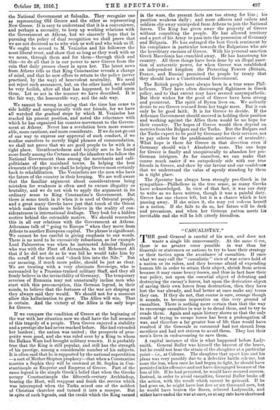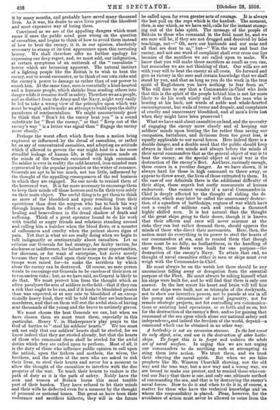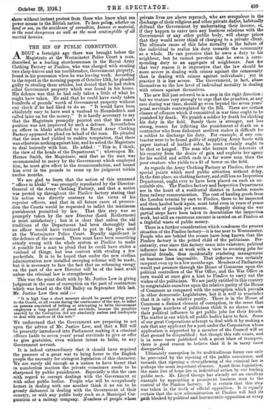" CASUALISTRY." T HE good General is careful of his men,
and does not waste a single life unnecessarily. At the same ti me, there is no greater error possible in war than for Generals or statesmen or nations to try to base their strategy or their tactics upon the avoidance of casualties. If once what we may call the' easualistic " view of war seizes hold of a nation or its rulers, and they become afraid of expending human life in order to attain their object, shrink from action because it may cause heavy-losses, and thus in fact base their war policy, not upon the essential object of defeating and destroying the enemy's forces, but upon the derivative object of saving their own forces from destruction, then they have lost the war already, and had better at once make any terms they can. If they do not, that course is sure, strange though it sounds, to become imperative on this very ground of casualties. There is nothing more certain than that the way to encourage casualties in war is to dread them, and to try to evade them. Again and again history shows us that the only result of trying to escape losses has been a prolongation of war, and therefore a far greater loss of life than would have resulted if the Generals in command had not shrunk from sacrifices and had not striven to avoid them. They lost their men's lives in endeavouring to save them.
A capital instance of this is what happened before Lady- smith. General Buller was himself the bravest of the brave, but he could not bear the strain of the slaughter at a particular point—i.e., at Colenso. The slaughter that upset him and his plans was very possibly due to a defective battle scheme, but none the less, when once he had begun to fight, he should have persisted in his offensive and not have disengaged because of the loss of life. If he had persisted, he would have secured success. Instead, in order to avoid casualties, General Buller broke off the action, with the result which cannot be gainsaid. If he had gone on, he might have lost five or six thousand men, but he would have beaten the Boers, relieved Ladysmith, and either have ended the war at once, or at any rate have shortened it by many months, and probably have saved many thousand lives. As it was, his desire to save lives proved the bloodiest and most expensive way of losing them. Convinced as we are of the appalling dangers which must ensue if once the public mind goes wrong on the question of casualties, and begins to think of how to avoid them instead of how to beat the enemy, it is, in our opinion, absolutely necessary to stamp at its first appearance upon this corroding heresy. We shall therefore offer no further apology for expreSsing our deep regret, and, we must add, our indignation, at certain symptoms of an outbreak of the " casualistic " heresy which are becoming apparent. The natural instinct of a fighting people like the British is to wish to beat the enemy, not to avoid encounter, or to think of our own risks and the enemy's power to damage us rather than of our power to smash him. At the same time, ours is essentially a kind-hearted and a humane people, which shrinks from sending others into danger while it remains itself in safety. Therefore we as a people, and as distinct from the Army and the Navy, might very easily be led to take a wrong view of the principles upon which war must be waged, and to make an attempt to build upon the shifty paradoxes of sentimentalism. We might unconsciously grow to think that " Don't let the enemy beat you " is a sound substitute for " Beat the enemy," or that " Keep out of the enemy's way " is a better war signal than" Engage the enemy more closely."
Perhaps the worst effect which flows from a nation being captured or influenced by the dread of casualties, or rather let us say of concentrated casualties, and adopting an attitude which if allowed to govern the war might lead to a far more dreadful leakage of human life, is the impression made on the minds of the Generals entrusted with high command. No soldier is ever in reality the cold-hearted, iron-minded man represented by the popular journalist or the writer of romance. Generals are apt to be too much, not too little, influenced by the thought of the appalling consequences of the red business in which they are engaged. No one needs to remind them of the horrors of war. It is far more necessary to encouragetliem to keep their minds off those horrors and to fix their eyes solely on their main object. The useful thing is to get them to think no more of the bloodshed and agony resulting from their operations than does the surgeon who has to hack his way through human flesh to effect a cure, and does his work of healing and benevolence in the dread shadow of death and suffering. Think of a great operator bound to do his work with tearful or angry friends and relations standing around and calling him a butcher when the blood flows, or a monster of callousness and cruelty whin the patient shows signs of pain. Yet that is what we are really doing when we begin to talk indignantly or sentimentally about casualties. Let us criticize our Generals for bad strategy, for faulty tactics, for slackness or indifference, for failure to seize great opportunities, for slowness, or for want of enterprise, but never merely because they have called upon their troops to do what those troops were raised for—to make the sacrifices by which alone the enemy can be destroyed. Of course, no sane person wants to encourage our Generals to be careless of their men or to run useless risks ; but, as we have said, no General is likely to do that. We must protect him from the thought which so often paralyses the arm of soldiers in the field—that if they run a risk that ought to be run, and if it leads-to bloodshed greater than was expected, or at any rate to bloodshed of an excep- tionally heavy kind, they will be told that they are butchers or murderers, and that on them will rest the awful stain of having sent thousands of the young and the brave to untimely graves.
We must choose the best Generals we can, bet when we have chosen them we must trust them, especially in this particular. Henry V. in Shakespeare's- play prays to the , God of battles to steel his soldiers' hearts." We too must ask not only that our soldiers' hearts shall be steeled, for we know indeed that they are steeled already, but that the hearts -of those who command them shall be steeled for the awful duties which they are called upon to perform. Most of all, it is the duty of those who influence public opinion to call upon the nation, upon the fathers and mother*, the wives, the brothers, and the sisters of the men who are asked to risk their lives, to steel their hearts and never for a moment to allow the thought of the casualties to interfere with the duo progress of the war. To teach their hearts to endure is the path of duty as it is the path of safety. Nobly have the men' and women of Britain borne this most terrible part of their burden. They have refused to let their mind's and their wills be deflected even for a moment by the thought of personal or national losses. But great as have been their endurance and sacrifices hitherto, they will in the future be called upon for even greater acts of courage. it is always the last pull on the rope which- is the hardest. The moment, then, is one- which, as we have said,calls for the instant stamp. ing out of the false spirit. The message of the people of Britain to those who command in the field must be, and we are sure will be, if they are not drugged and deceived by false teachings, not—" Oh, save our husbands and our sons and all that are dear to us," but—" Win the war and beat the enemy, and. net one word of complaint shall ever cross our lips because of the sacrifices we are called upon to make. We know that you will make those sacrifices as small as you can, but remember we are not thinking of that. Our wills are set with your will to beat the enemy at all costs. Go- forward and give us victory in the sure and certain knowledge that we shall stand by you, and that as long asyou do the work in the true spirit of Englishmen you have nothing to fear from us." Who will dare to say that a Commander-in-Chief who feels that this is the spirit of the people -behind him is not fee more likely to do his work wisely and well than the man who is hearing at his back; net words of noble and whsle hearted encouragement, but wails of terror and despair, and complaints of cruelty and unnecessary, bloodshed, and of men's lives lost When they might have been preserved ?
What we have said about casualties on land, and the necessity, of engaging the enemy mom closely and of keeping out soldiers' min& upon beating the foe rather than saving our compaides, battalions, and divisions from too great IosS, is equally applicable to our naval forces-. Here indeed there- is a double danger; and a double need that the public should keep alviaya in their own .minds and always before' the minds of their naval coramandeta that as the general object of war is to beat the enemy, so the special object of naval weir is' the destruction of the enemy's fleet. Arid here, curiously enough; there comes in a peculiar danger. As we have shown, it it always hard for those in high command to throw away, or appear to throw away, the lives of those entrusted to them: h the case of our Admirals there is the additional difficulty of their ships-, those superb but costly monuments of human endeavour. One cannot wonder if a naval Commander-in- Chief is deeply affected by the thought of risking the de' struction, which May later be called the unnecessary destrdc-, tion, of a squadron of- battleships; engined of war which have Cost a couple of Millions each and contain a thousand highly skilled men. It is but natural that the thought of the great ships going to their doom, though it is kaireth that their officers and crew will never murmur at the risks they nth but rather demand them, should oppress the Minds. of those who direct their movements. Here, then, the nation must do everything in its power to steel the hearts' of our commanders at sea, and to remind theta thatthough there must be no folly, no foolhardiness, in the handling of our fleets, those fleets were built for one parpose=the destruction of the enemy's Navy. To attain that end; no thought of naval casualties either in men or ships must ever weigh with the Commander-in-Chief.
He must always be on the watch lest there should be any unconscious falling a-way or derogation- from. the essential purpose of the Fleet. He must always be asking himself what his ships- Were built for, and he will find that there is Only one answer. In the last resort his heart and brain will tell hint that our ships were built; not as triumphs Of the dockyards, not to show our inventive powers, not to parade at sea in all the pomp and circumstance' of ' naval pageantry, not for remote strategic- projects, not -tot controlling• sea communica- tions or assisting land operations, or so forth and so on; but for the destruction of the enemy's fleet, andso-for gaining that command of the sea upon which alone our national safety and independence, and indeed the freedom of thsworld., depend--a command which can be obtained in no other way.
A battleship is not an excursion steamer. In the last resort its only object, aim, and use -is the destruction of other battle- ships. To forget this is to forget and unlearn the whole art of natal warfare. In urging this we are not urging our commanders to do anything rash or attempting to sting them into action. We trust them, and we trust their obeying the naval spirit. But when we see false prophets like Mr. Winston Churchill showing, not the old way and the true way, but a new way and a wrong way, we are bound to make our protest, and to remind those who con. trot' our Navy that there is one, and only one, ultimate method of commanding the sea, and that is by destroying the enemy's naval forces. How to do it and when to do it is, of course, a matter for those who have the technical knowledge and on whom the responsibility is placed. Pleas, however; for the avoidance of action must never be allowed to come from the ahore without instant protest from those who know what sea power .means to the British nation. To base polio, whether on land or sea, on the avoidance of casualties, human or Material, is the most dangerous as well as the most contemptible of all martial heresies.




































 Previous page
Previous page